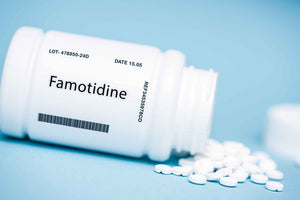An estimated 15 million Americans regularly use prescription and over-the-counter H2 antagonists, underscoring their significance in controlling acid-related disorders.
What are Acid-Related Disorders?
Acid-related disorders, such as dyspepsia, peptic ulcer disease (PUD), gastroesophageal reflux disease (GERD), or laryngopharyngeal reflux are all caused by an overproduction of stomach acid that can enter your esophagus.
What are H2 Antagonists?
H2 Antagonists, also known as histamine type 2 receptor blockers, have become essential in managing acid-peptic diseases, including duodenal and gastric ulcers, gastroesophageal reflux disease (GERD), and common heartburn.
So, what are H2 Antagonists? H2 antagonists, sometimes referred to as H2 blockers, are a class of medications that block the action of histamine at the histamine H2 receptors in the stomach. This decreases the production of stomach acid.
Among the most common pharmaceutical brands and names of H2 antagonists are Ranitidine (Zantac), Famotidine (Pepcid), Cimetidine (Tagamet), and Nizatidine (Axid). Each of these medications has a unique potency and side effect profile, and the choice of H2 antagonist is usually tailored to the patient's needs and overall health condition.
Side Effects of H2 Antagonists
Despite their broad usage and effectiveness, long-term use of H2 antagonists can potentially lead to certain nutrient deficiencies. This article will delve into these deficiencies, their implications, and how to manage them effectively.
While H2 antagonists are generally safe and effective, they can affect specific nutrients, namely vitamin B12 and iron. Not every individual on H2 antagonist therapy will develop these deficiencies, but it's crucial to be aware of the potential risks.
Vitamin B12 Deficiency
H2 antagonists reduce stomach acid, which is necessary to absorb vitamin B12. Long-term use of these medications can potentially lead to B12 deficiency. A study in the Journal of the American Medical Association (JAMA) found that long-term use of H2 antagonists was associated with vitamin B12 deficiency.
Solution: Regular monitoring of vitamin B12 levels is recommended for individuals on long-term H2 antagonist therapy. If necessary, supplementation might be recommended under the guidance of a healthcare provider.
Iron Deficiency
Similar to vitamin B12, iron absorption also requires stomach acid. Long-term use of H2 antagonists can potentially lead to iron deficiency, as reported by a study in the Journal of Clinical Gastroenterology.
Solution: Regular monitoring of iron levels and potential iron supplementation might be necessary for patients on these medications. Including iron-rich foods in the diet may also be beneficial.
Importance of Testing and Supplementation
As not everybody on an H2 antagonist regimen will experience these deficiencies, it is essential to do regular tests for potential deficiencies, as not all symptoms are indicative. Many supplements counter these deficiencies and allow patients to lead a balanced life.
Conclusion
H2 antagonists are highly beneficial for individuals suffering from acid-peptic diseases. However, their long-term use can lead to certain nutrient deficiencies, namely vitamin B12 and iron. By staying informed about these potential deficiencies and addressing them promptly through regular testing and possible supplementation or dietary adjustments, patients on H2 antagonists can continue to lead a healthy, balanced life.
Always remember that any medication or supplementation should be under the guidance of a healthcare provider to ensure its safety and effectiveness.


